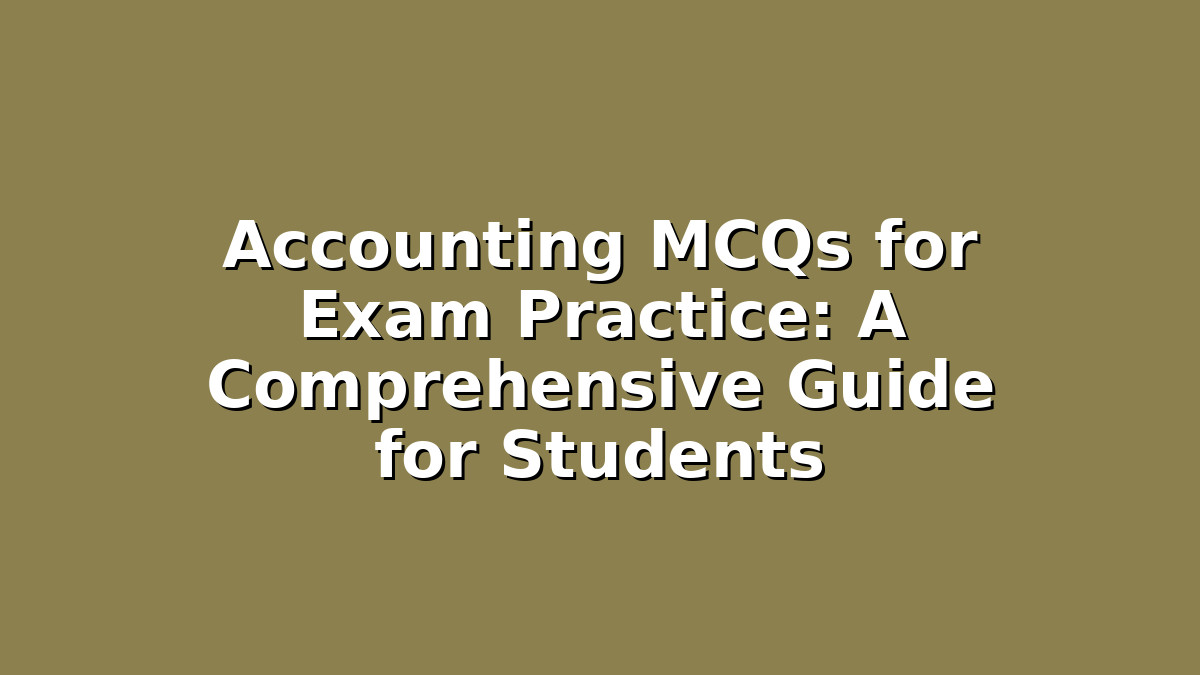Preparing for accounting exams can be a challenging yet rewarding experience. Whether you are studying for your high school accounting test, a college-level course, or professional certification exams, mastering the core concepts is essential. One of the most effective ways to reinforce your understanding and boost your confidence is through practicing multiple-choice questions (MCQs). In this article, we will explore why accounting MCQs are valuable, how to use them effectively, and some study tips to maximize your exam performance.
Why Accounting MCQs Are Essential for Exam Preparation
Multiple-choice questions are a popular exam format because they test your knowledge on a wide range of topics in a structured, objective way. For accounting students, MCQs help in several important ways:
1. Broad Coverage of Topics: Accounting covers various topics such as financial accounting, managerial accounting, auditing, taxation, and accounting principles. MCQs allow you to quickly assess your grasp of these areas, highlighting strengths and weaknesses.
2. Time Management Practice: Exams often have strict time limits. Regularly practicing MCQs helps you develop an efficient approach to answering questions quickly and accurately, which is critical for success.
3. Immediate Feedback: Many MCQ practice tests provide instant feedback, helping you understand mistakes and learn correct concepts faster. This immediate reinforcement boosts memory retention.
4. Exam Readiness: Familiarity with the MCQ format reduces test anxiety. Knowing what to expect on exam day helps you remain calm and focused.
Section 1: How to Use Accounting MCQs Effectively
To get the most out of accounting MCQs, follow these strategies:
– Start with Fundamentals: Begin your practice with questions covering basic accounting principles such as the accounting equation, double-entry bookkeeping, and financial statement components. This builds a strong foundation.
– Use Quality Resources: Utilize reputable sources like textbooks, online learning platforms, or official exam preparation materials. Poorly constructed MCQs can confuse rather than help.
– Simulate Exam Conditions: Set a timer and complete MCQ sets without interruptions. This simulates real exam conditions and improves concentration.
– Review Every Question: Don’t just mark an answer and move on. Spend time analyzing why the correct answer is right and why the others are wrong. This deepens understanding.
– Keep a Mistake Log: Record questions you answered incorrectly and revisit them regularly. Over time, this helps identify patterns in your weak areas.
Section 2: Integrating MCQs with Other Study Methods
While MCQs are powerful, combining them with other study techniques enhances your learning:
– Reading and Summarizing: Before jumping into MCQs, read your textbook chapters or lecture notes thoroughly. Summarize key points in your own words to solidify concepts.
– Flashcards for Key Terms: Create flashcards for important accounting terminology and formulas. Use these to quickly refresh your memory alongside MCQ practice.
– Group Study Sessions: Discuss tough MCQs with classmates. Explaining concepts to others is a proven way to improve your own understanding.
– Practice Problem-Solving: Accounting often requires calculations and problem-solving beyond MCQ selections. Work through practical exercises and case studies to complement MCQ practice.
– Seek Help When Stuck: Don’t hesitate to ask teachers, tutors, or online forums for clarification on confusing questions. Understanding the “why” behind answers is critical.
Section 3: Tips for Staying Motivated and Consistent
Consistency is key when preparing for exams. Here are some tips to maintain motivation while practicing accounting MCQs:
– Set Realistic Goals: Break your study schedule into manageable daily or weekly MCQ targets. Celebrate small victories to keep morale high.
– Mix Easy and Challenging Questions: Start your session with simpler questions to build confidence, then gradually increase difficulty to stretch your skills.
– Use Technology Wisely: Many apps and websites offer timed MCQ quizzes with progress tracking. Use these tools to stay engaged and monitor improvement.
– Take Breaks: Don’t overwork yourself. Short breaks during study sessions help maintain focus and prevent burnout.
– Visualize Success: Imagine yourself confidently answering exam questions and achieving your desired results. Positive visualization can boost motivation.
– Reward Yourself: After completing a set number of MCQs, reward yourself with something enjoyable—whether it’s a snack, a walk, or some leisure time.
Conclusion
Accounting MCQs are an invaluable resource for students prepping for exams. They offer a practical way to assess knowledge, improve time management, and build confidence. By using MCQs effectively—starting with fundamentals, integrating them with other study methods, and maintaining consistent motivation—you can enhance your understanding and perform better on test day. Remember, persistence and smart practice are your best allies in mastering accounting concepts. Keep practicing, stay positive, and your hard work will pay off!

Responses